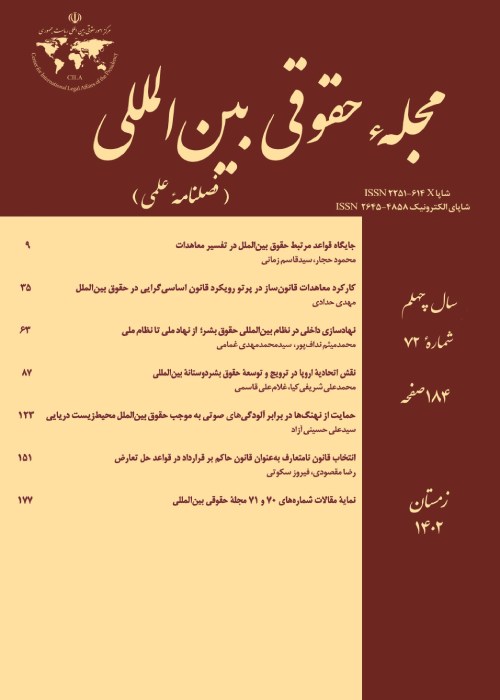International community and international obligations erga omnes
Author(s):
Abstract:
A little noted but notable thing in international law is the fact that states ever comply with its stipulations and strictures voluntarily, this denoting to the legitimacy of the international system and the existence of the international legal community. International obligations erga omnes, including those deriving from the principles and rules concerning the basic rights of the human person are referred to as associative or community obligations, abiding by them is entailed not by the specific consent of a member in a strictly contractual sense, but by the mere fact of membership in the community, the former being identified as assumed. Hence, the ICJ in it’s advisory opinion on the Genocide convention has affirmed that the principles underlying the convention were binding on states “even without any conventional obligation”. So, as judge Tanaka in his dissenting opinion to the judgment in the south west Africa cases, second phase (1966) put it: Human rights derive from the concept of the human being as a person. States do not create human rights, but only confirm their existence. Thus, human rights exist independently of the will of states. As a result, states which do not recognize this principle [i.e. the protection of human rights] or even deny it’s existence are nevertheless subject to it’s rule. The Second World War featured several states massive betrayal of the lives and liberties of persons, including even their own civilians, as such, it created better understanding of the inextricable connection between international protection of human rights and the maintaining of world peace. The subsequent canon of human rights laws, ratified voluntarily by a large number of states, conferred, as against the governments, the right to be let alone, to individuals. Of the various indicators of individual autonomy, freedom of conscience is probably the most fervently desired by individuals and certainly has been the most strenuously resisted by authorities. Reference made by the court in connection with international obligations erga omnes to the basic rights of the individual shows that the international community is, in the court’s view, an unorganized body distinct from the single states which constitute it; this community “as a whole” is founded on some fundamental principles. This is the conclusion which can be derived from this judgment.
Language:
Persian
Published:
International Law Review, Volume:22 Issue: 33, 2006
Page:
9
magiran.com/p309127
دانلود و مطالعه متن این مقاله با یکی از روشهای زیر امکان پذیر است:
اشتراک شخصی
با عضویت و پرداخت آنلاین حق اشتراک یکساله به مبلغ 1,390,000ريال میتوانید 70 عنوان مطلب دانلود کنید!
اشتراک سازمانی
به کتابخانه دانشگاه یا محل کار خود پیشنهاد کنید تا اشتراک سازمانی این پایگاه را برای دسترسی نامحدود همه کاربران به متن مطالب تهیه نمایند!
توجه!
- حق عضویت دریافتی صرف حمایت از نشریات عضو و نگهداری، تکمیل و توسعه مگیران میشود.
- پرداخت حق اشتراک و دانلود مقالات اجازه بازنشر آن در سایر رسانههای چاپی و دیجیتال را به کاربر نمیدهد.
دسترسی سراسری کاربران دانشگاه پیام نور!
اعضای هیئت علمی و دانشجویان دانشگاه پیام نور در سراسر کشور، در صورت ثبت نام با ایمیل دانشگاهی، تا پایان فروردین ماه 1403 به مقالات سایت دسترسی خواهند داشت!
In order to view content subscription is required
Personal subscription
Subscribe magiran.com for 70 € euros via PayPal and download 70 articles during a year.
Organization subscription
Please contact us to subscribe your university or library for unlimited access!


